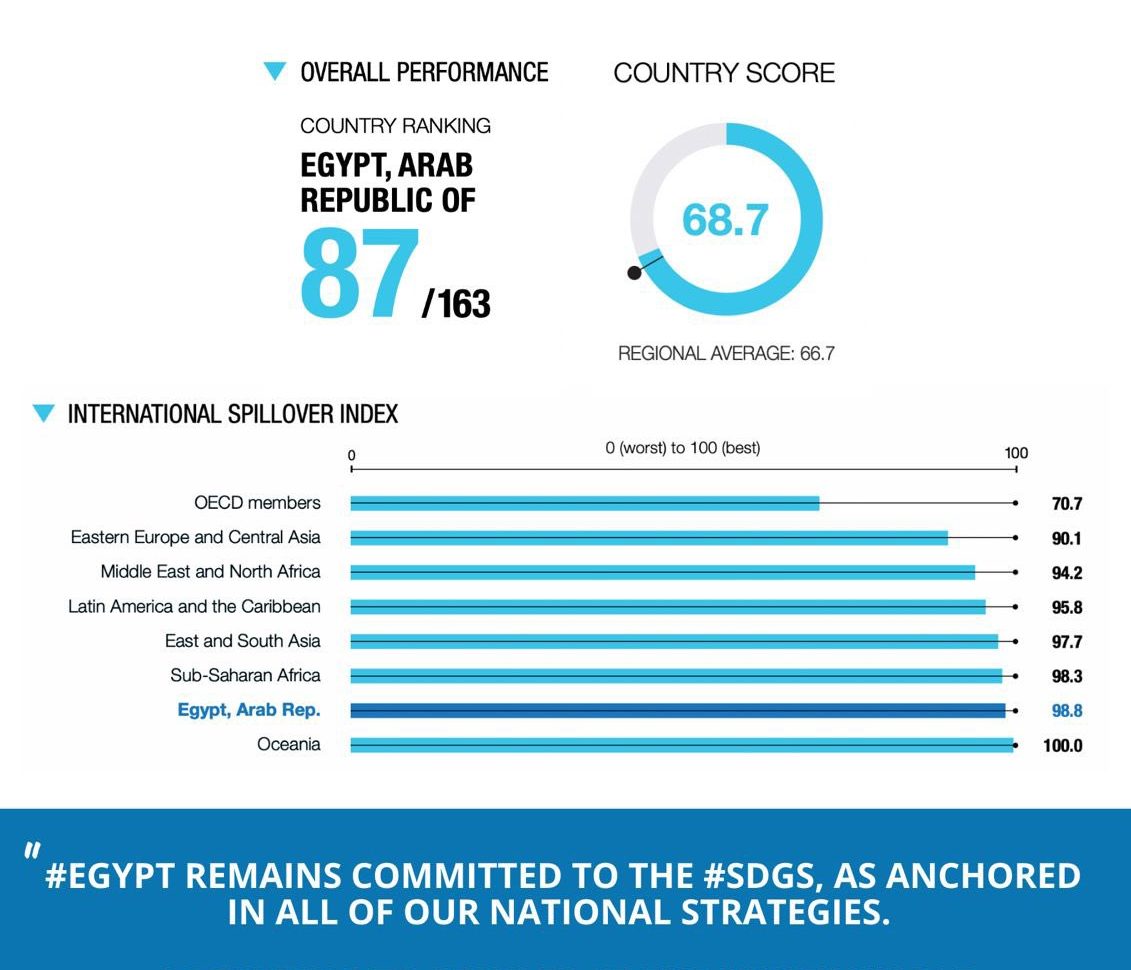
5 Steps to Build an Effective CSR Strategy
In today’s business landscape, Corporate Social Responsibility (CSR) has evolved from being a “nice-to-have” to ...

Egypt ranked the 87th on the 2022 Sustainable Development Goals (SDGs) Index which included 163 countries.
On Twitter, International Cooperation Minister Rania Mashat said Egypt remains committed to the Sustainable Development Goals as anchored in its national strategies.
According to the Sustainable Development Report, Egypt’s 2022 SDG index scored 68.7, positioning the country above regional average, a step forward compared to the 2021 results, Mashat tweeted.
The Sustainable Development Report is a global assessment of countries’ progress towards achieving the Sustainable Development Goals. It is a complement to the official SDG indicators and the voluntary national reviews
This global assessment indicates that Egypt is showing positive progress especially in SDG 6, SDG 10, SDG 12, and SDG 13, she noted.
She added “At the Ministry of International Cooperation, we continue to push the global goals by engaging with all stakeholders to foster multilateralism and strengthen international partnerships.”
Countries are ranked by their overall score. The overall score measures the total progress towards achieving all 17 SDGs. The score can be interpreted as a percentage of SDG achievement. A score of 100 indicates that all SDGs have been achieved.
The top ten countries on the index are Finland, Denmark, Sweden, Norway, Austria, Germany, France, Switzerland, Ireland and Estonia.
Algeria came in the 64th position, while Tunisia ranked the 69rd, followed by Jordan the 80th.
Oman came in the 81st position, Morocco in the 84th, UAE in the 85th and Qatar in the 94th.
Saudi Arabia ranked the 96th, followed by Lebanon in the 97th position, Kuwait in the 101st, Bahrain in the 102nd, and Iraq in the 115th .
Syria ranked the 129th, while Yemen came in the tail of the Arab countries list raking number 150th.
Mauritius came in the 98th position, while South Africa in the 108th, Ghana in the 110th and Gabon in the 113th.
Namibia ranked 114th, Botswana 116th, Kenya 118th, Gambia 122nd, Sai Tome and Principle 123rd, Rwanda 124th, Senegal 126th, Cote d’Ivoire 127th, Ethiopia 128th, Tanzania 130th, Zimbabwe 131st and Mauritania 132th.
The report included several other African states, like Sudan, Togo, Guinea, Malawi, Somalia and Central Africa.
More about the Sustainable Development Report:
The Sustainable Development Report (SDR) 2022 identifies major priorities to restore and accelerate SDG progress towards 2030 and beyond. It was issued ahead of the SDG Summit in September 2023, which will convene at the level of heads of state under the auspices of the United Nations General Assembly.
The SDR 2022 combines data and analyses produced by international organizations, civil society organizations, and research centers.
For the second year in a row, the world is no longer making progress on the SDGs. The average SDG Index score slightly declined in 2021, partly due to slow or nonexistent recovery in poor and vulnerable countries. Multiple and overlapping health and security crises have led to a reversal in SDG progress. Performance on SDG 1 (No Poverty) and SDG 8 (Decent Work and Economic Growth) remains below pre-pandemic levels in many low-income countries (LICs) and lower-middle-income countries (LMICs).
This is a major setback, especially considering that before the pandemic, over the period 2015–2019, the world was progressing on the SDGs at a rate of 0.5 points per year (which was also too slow to reach the 2030 deadline), with poorer countries making greater gains than rich countries. Progress on climate and biodiversity goals is also too slow, especially in rich countries. Ahead of the heads of state SDG Summit in 2023, restoring and accelerating SDG progress in all countries, including the poorest and most vulnerable, should be a major priority of recovery plans and reforms to the international development finance system.
Achieving the SDGs is fundamentally an investment agenda in physical infrastructure (including renewable energy) and human capital. Yet the poorest half of the world – roughly speaking, the low-income countries (LICs) and lower-middle-income countries (LMICs) – lacks market access to capital on acceptable terms. The report highlights five priorities towards a global plan to finance the SDGs.
First, the G20 should declare clearly and unequivocally its commitment to channel far larger flows of financing to developing countries so that they can achieve economic development and meet the SDG targets.
Second, the G20 should greatly increase the lending capacity and annual flows of the Multilateral Development Banks (MDBs), mainly through greater paid-in capital to these institutions, but also through greater leverage of their balance sheets.
Third, the G20 should support other measures as well – notably increased ODA, large-scale philanthropy, and refinancing of debts falling due – to bolster SDG finance for the LICs and LMICs.
Fourth, the IMF and the credit-rating agencies need to redesign the assessments of debt sustainability, taking into account the growth potential of developing countries and their need for far larger capital accumulation.
Fifth, working together with the IMF and the MDBs, developing countries need to strengthen their debt management and creditworthiness by integrating their borrowing policies with tax policies, export policies, and liquidity management, all to prevent future liquidity crises.
At mid-point on the way to 2030, policy efforts and commitments supporting the SDGs vary significantly across countries, including among G20 countries. Ambitious and sound national targets, strategies, and plans are crucial to turning the SDGs into an action agenda.
اترك تعليقا